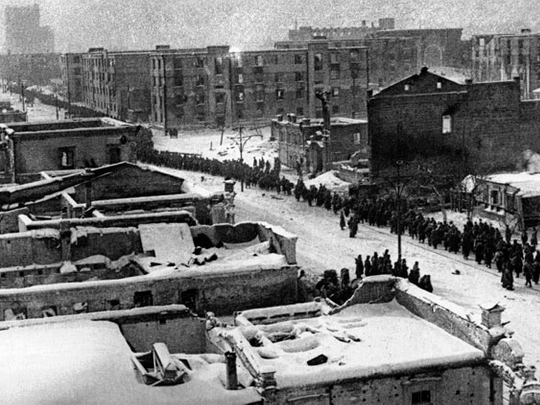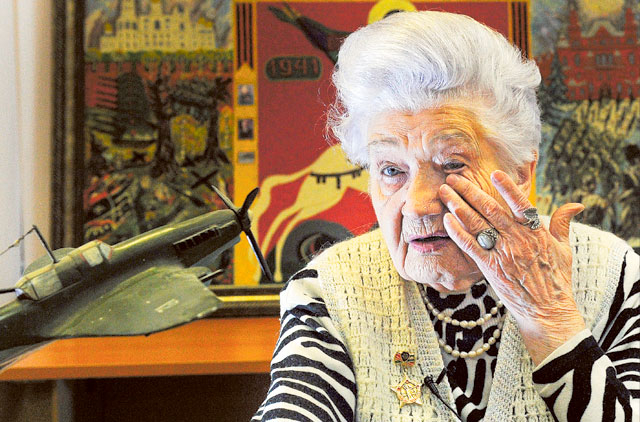
VOLGOGRAD, Russia: In a new display of national pride and reminder of its status as a world power, Russia on Saturday remembers the Red Army victory in the battle of Stalingrad over invading Nazi forces, one of the bloodiest battles in human history.
The turning point in the Second World War that claimed up to two million lives on both sides, the battle of Stalingrad is remembered in post-Soviet Russia as a heroic victory despite the horrific human toll and the often questionable strategy of Soviet dictator Josef Stalin.
The southern city was renamed as Volgograd in 1961 after the Soviet Union’s leaders admitted the extent of the crimes of the tyrannical leader. But the old name of the city remains synonymous with a battle that lasted half a year.
President Vladimir Putin - who has emphasised victory in what Russians call the Great Patriotic War as the country’s greatest achievement - is expected to attend commemorations in Volgograd which will include a march by hundreds of soldiers in Red Army uniforms.
“The battle of Stalingrad is the most striking symbol of the Great Patriotic War. The war is still alive in the memory of those who experienced it and their loved ones,” the historian Vitaly Dymarsky told AFP.
“Patriotism is a focal point for the current authorities, who are clearly looking back. They do not want to remember the 1990s and it’s for this reason that they have chosen the Soviet past,” he added.
Russian state television will on Saturday broadcast a new dramatised documentary which it promises will reveal new secrets about a “battle which changed world history”.
“The word Stalingrad has become a symbol of the steadfastness of the Russian army, the courage of the Russian soldier,” state-run Rossiya 1 said.
‘We always had Stalin in our heads’
While not denying Stalin’s crimes before the war in the murderous purges of innocent citizens and deadly forced collectivisation, Russia’s modern leaders have preferred to overlook the disastrous errors in military strategy he made during the war.
Russia’s Communist Party has submitted a petition to Putin signed by more than 35,000 people demanding that Volgograd be renamed Stalingrad. Nevertheless a poll last year by the independent Levada Centre showed that only 18 percent of Russians were in favour.
“We always had Stalin in our heads,” said Maria Rokhlina, 89, who worked as a nurse on the front line, remembering the leader’s famous order of “Not a Step Back!”
The city was left in ruins by the war and its centre was rebuilt in grandiose style. It’s now home to over one million people, its ribbon of suburbs stretching seemingly endlessly down the Volga river.
The city is overlooked by an iconic 87-metre high statue “The Motherland Calls” of a sword-wielding woman striding forwards in an unforgettable assertion of Soviet power and might.
It is one of the highest monuments in the world, unveiled in 1967 in a memorial park as a symbol of recovery from the ruins of war.
‘The wounded arrived all the time’
After six months of bloody combat - including hand-to-hand fighting in the ruined streets - the USSR’s growing superiority in armaments production on the home front made itself felt and the Red Army encircled the Nazi troops.
The German commander Friedrich von Paulus - promoted to Field Marshal by Hitler on the expectation he would defend the city to the death - capitulated on January 31. The full surrender was complete by February 2.
Some 91,000 Wehrmacht soldiers were taken prisoner, including Paulus himself who disobeyed Hitler’s orders to die fighting. He later gave evidence against his Nazi superiors at the Nuremberg trials, was released in 1953 and lived in the Soviet satellite GDR until his death in 1957.
The surrender was the first major defeat sustained by the Nazis in the war and marked the beginning of their retreat from Soviet territory after the lightning invasion of 1941 that had taken Stalin completely unaware.
Yet the human cost of the battle left wounds that have yet to heal on both sides.
“There was bombing from nine in the morning until four in the afternoon,” said Taisa Postnova, 93, who was sent to the battle as a nurse.
“The wounded arrived all the time. Those that we treated went back to the front.”
She remembered staying alive on the most minimal water supplies.
“Often those who couldn’t stand it any longer went to the Volga to find water but were shot dead.”













